At 17, Nai managed to escape her forced wedding on the very day of the ceremony: The silent revolution of the Maasai of Tanzania
For almost 30 years, the Pastoral Women’s Council has defended the rights of women in the community. They have managed to prevent forced marriages, while helping Maasai women and girls access education and land ownership
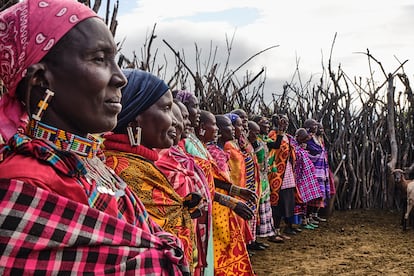
Naishorua Masago — known to everyone as Nai — was 13-years-old the day she met her biological father. She had just finished primary school and was standing in the courtyard of her home, a small adobe building in the village of Kirtalo, in northern Tanzania, when a stranger came calling.
“My father? I was already living with my father and mother. I didn’t know who this man was,” she tells EL PAÍS. Still, he insisted: “It’s time for you to get married, Nai,” he told her. That day, in 2008, this young Maasai woman discovered many things: that she had grown up with her grandparents, believing them to be her parents, and that the man she had never met had already decided her future.
At the time, echoes of the work of the Pastoral Women’s Council (PWC) — an organization created in 1997 by nine Maasai women to defend their rights in the community — were already resonating among the inhabitants of the territory, a vast area that spans tens of thousands of miles between Kenya and Tanzania. Nai first learned about the organization through its founder, Maanda Ngoitiko, who was a guest of honor at her graduation. Nai had been second in her class and PWC offered her a scholarship to continue her studies at Emanyata Secondary School, a center in the Ngorongoro District, also in the north of the country, run by the organization since 2006. Thanks to this assistance, Nai avoided being married off at an early age.
“To get the PWC scholarship, you have to come from a low-income family and be exposed to the risk of forced marriage or gender-based violence,” explains Lakati Kulal, director of the school since 2021. Nai, who met both requirements, was able to study there for a total of four years.
But when Nai returned to her grandmother’s house with a high school diploma under her arm, her father came back. And this time, he took her away. She was 17. “I told him that I wanted to continue studying, not get married. My mother told me that would be a disgrace,” Nai explains. She is dressed in a red shuka — a traditional dress — and wears several necklaces.
Now 28, she recalls how she desperately asked a passing motorcyclist to inform the PWC, since her wedding was scheduled for the next day. On the morning of the ceremony, the organization was able to rescue her and take her to a shelter.
Women changing traditions
Until 2019, Tanzania’s Marriage Act allowed girls to marry at the age of 15. This is contrary to the Maputo Protocol — the African Union’s Charter on the Rights of Women — which sets the minimum age at 18. That year, the High Court of Tanzania banned marriage before the age of 18 and ordered the government to raise the minimum age within a year. However, child marriages persist, according to data from UNICEF. There are currently 125 million girls on the African continent who were forced into marriage before the age of 18. According to the international NGO Girls Not Brides: The Global Partnership to End Child Marriage, one in three girls in Tanzania is married before the age of 18. And 5% of these girls are married off before the age of 15.
The Pastoral Women’s Council is fighting against gender-based violence and forced marriages, the abolition of female genital mutilation, as well as access to drinking water and land ownership. According to its leaders, they receive support from Tanzanian and foreign donors, including the European Union. Education is a key part of the strategy, for which they’ve had the fundamental support of the Malala Fund.
At Nai’s school, more than 700 girls have received scholarships. And 250 have completed university courses. “They’re all girls who escaped child marriage,” Kulal notes. In the early days, the PWC encountered many barriers to getting its work off the ground: “The fact that a group of women came to change traditions was not well received by the men. But the fact that we were Maasai played a decisive role,” Ngoitiko says.
The founder admits that progress is visible, although certain oppressive attitudes still persist: “The Maasai are an extremely patriarchal society, in which women and girls have always been treated as inferior,” she stresses.
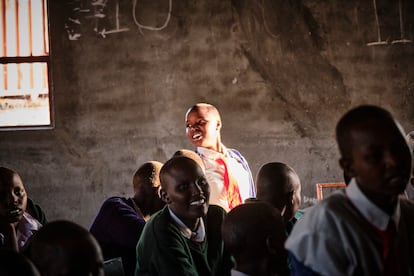
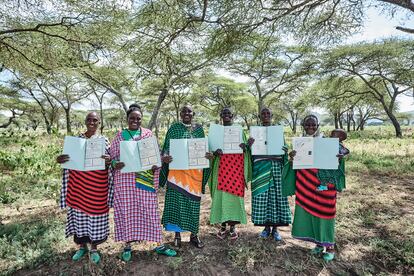
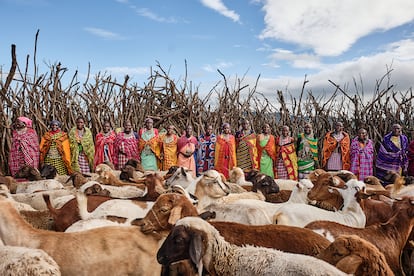
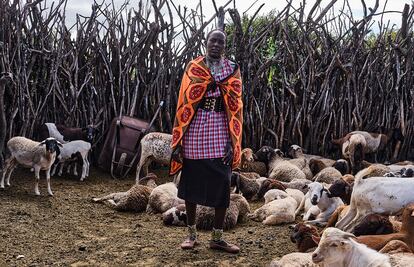

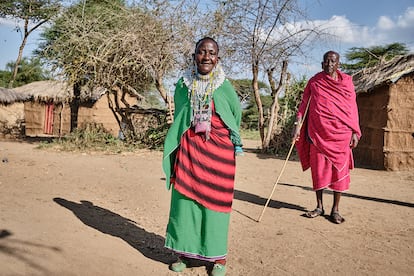
Over the years, the Pastoral Women’s Council has expanded its reach, creating projects to promote women’s economic independence. “In 2016, we formed groups of 15 to 20 women, who save weekly and contribute to two common funds: one for emergencies and one for credit,” explains Stella James, one of the project managers. From then on, everything changed for thousands of Maasai women.
“Before, we stayed at home. When we needed money, we had to ask our husbands for it. Now, we all have small businesses: we have built houses and we share the profits,” says Naire Lio, leader of a common fund group in the Longido District. “We’ve never lived in times like this: now, we contribute, we don’t beg,” she adds.
Lio and her colleagues decided to share their knowledge with women from neighboring villages. They also created six new community banks. They pooled their earnings and bought, for example, a maize mill, to grind the grain without having to travel. “Now, people come to buy from us and, with that money, we sustain ourselves,” she explains. This model has been replicated in the 127 villages in the three districts where the PWC works, fostering community solidarity and benefiting more than 15,000 women, according to the organization.
Their own land
Although a recent survey by Afrobarometer concluded that 85% of Tanzanians were in favor of both women and men having the right to own land, only 8.1% of women in Tanzania own land individually. “Maasai women have never had the right to property. Everything belongs to our husbands: the house, the cattle… even our children belong to them,” Ngoije laments. She’s one of the women from the Longido District who owns her own land.
Being a landowner in Tanzania means being immersed in a complex system, due to a dual system of governance: statutory law — which grants equal rights to men and women — and customary law (unwritten rules based on custom), which favors men. Therefore, the PWC gets community leaders involved and sensitizes them to the importance of registering land in the name of women. “Here, when a leader speaks, everyone is silent. We used the argument that the government is taking land away from the Maasai [men], so that the properties should be registered in our names,” Ngoije says.
“This wouldn’t have been possible if we had tried to convince our husbands. We had to resort to the chiefs to achieve this,” Ngoije continues. Today, she has an official government document certifying her ownership. So far, more than 350 women have applied for and received plots of land. “The most important thing has been the change in the men’s mentality. We now have a voice and our rights are recognized,” says Namyak Makanot. She is Ngoije’s daughter and is also a beneficiary of this shift.
The solidarity of free women
“A Maasai — whether man or woman — is [destitute] if he or she doesn’t own livestock,” Nabulu explains. She’s a resident of the town of Loliondo. That was the premise under which the solidarity bomas were created in 1998. These are livestock cooperatives that promote ownership and income generation for women. The solidarity bomas are the same as traditional ones, with the difference being that they’re managed by women, while the livestock is their property.
For three years, several women live together, manage businesses, care for livestock, support students and establish community banks, in a safe space for dialogue. Afterward, they return home with their livestock and savings, while another group takes over from them. “This gives us respect in front of men and allows us to have a voice in the committees,” Nabulu explains. She plans to run as a candidate to be the next community leader. “Maasai women need to be in positions of power to decide our agenda and be valued,” she affirms.
With the jingling of cattle bells in the background, Runi Mukanda — a Maasai chief — admits that he “used to think of women as weak. But now, their strength is clear.” Sitting next to him, his wife, Ngoije, chimes in: “He was very aggressive… but now, I can relax when I talk to him.” Mukanda forced his daughter, Namyak, to get married at the age of 14. What if he could go back in time and make the decision again? “I don’t think I would even have the authority to do so. A girl can now decide who she marries and when. It’s not like before,” the father replies.
Sign up for our weekly newsletter to get more English-language news coverage from EL PAÍS USA Edition
Tu suscripción se está usando en otro dispositivo
¿Quieres añadir otro usuario a tu suscripción?
Si continúas leyendo en este dispositivo, no se podrá leer en el otro.
FlechaTu suscripción se está usando en otro dispositivo y solo puedes acceder a EL PAÍS desde un dispositivo a la vez.
Si quieres compartir tu cuenta, cambia tu suscripción a la modalidad Premium, así podrás añadir otro usuario. Cada uno accederá con su propia cuenta de email, lo que os permitirá personalizar vuestra experiencia en EL PAÍS.
¿Tienes una suscripción de empresa? Accede aquí para contratar más cuentas.
En el caso de no saber quién está usando tu cuenta, te recomendamos cambiar tu contraseña aquí.
Si decides continuar compartiendo tu cuenta, este mensaje se mostrará en tu dispositivo y en el de la otra persona que está usando tu cuenta de forma indefinida, afectando a tu experiencia de lectura. Puedes consultar aquí los términos y condiciones de la suscripción digital.








































